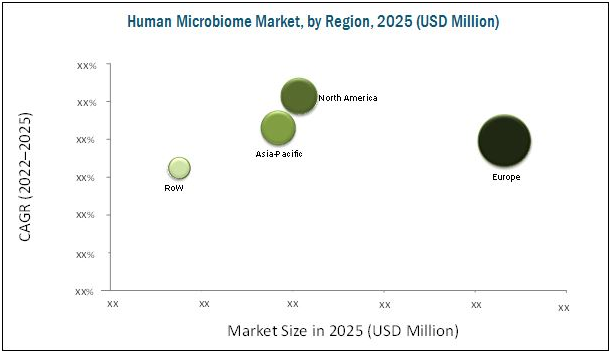Major Industry Drivers:
Increased Focus on Human Microbiome Therapy
Human Microbiome as New Validated Target for Drug Development
Human Microbiome for Early Disease Detection and Diagnosis
Major Growth Restraints:
Lack of Expertise and Detailed Research
Barriers in Proving the Causal Link Between Dysbiosis and Disease
Opportunities:
Investigational New Drug (IND) Requirements for Fecal Microbiota
Increasing Collaborations Create Growth Opportunities
Challenge:
Government Regulations
Burning Issues:
Abundant Opportunities in the Human Microbiome Field and Tremendous Research Investments
Development of Human Microbiome Therapeutic Products
Download the PDF Brochure to Read More Details@ http://bit.ly/2P2JddO
Enterome Bioscience (France), Yakult (Japan), DuPont (U.S.), Metabiomics Corporation (U.S.), ViThera Pharmaceuticals (U.S.), Second Genome Inc. (U.S.), MicroBiome Therapeutics LLC (U.S.), Vedanta BioSciences (U.S.), Osel, Inc. (U.S.), and Merck (U.S.) are the major players in the human microbiome market. Domination of the individual segments in this market will depend on the core competencies of different players.
Companies that launch products targeted at specific indications in the human microbiome market are likely to maintain their positions in this market. Pfizer is one such company; it releases medicines and vaccines for specific indications. The firm also entered into an agreement with Second Genome for microbiome research in obesity and metabolic disorders.
Companies in the human microbiome market are majorly focusing on expanding and entering segments for new indications and technology. The key strategy is to expand market share through acquisitions and connect financially with firms having common values and goals. To gain maximum market share, companies have been aggressively signing agreements, collaborations, and partnerships with third-party vendors.
Enterome Bioscience is one such company the company focuses on developing biomarkers, companion diagnostic kits, and therapeutic solutions. The company provides products and technologies in the emerging areas of disease management for human gut microbiome and drugs for the treatment of various microbiome-related diseases, such as inflammatory bowel disease, metabolic diseases, and related disorders.
In-depth research into the human microbiome market revealed that agreements, partnerships, and collaborations were the key strategies adopted by major players to enter the microbiome business or expand their microbiome business units.
Major players that adopted this strategy include Second Genome (U.S.), Enterome Bioscience (France), Vedanta Bioscience (U.S.), and Osel, Inc. (U.S.). In April 2016, Enterome entered an agreement with Vertex Pharmaceuticals Inc. (U.S.) to research, develop, and commercialize novel small molecule FimH antagonists, to be utilized in the treatment of inflammatory bowel diseases (IBD).
Companies in the Asia-Pacific regions are also entering the field of microbiome. Yakult Honsha Co., Ltd. is one such company which is engaged in manufacturing and marketing food and beverage products. The company operates through three business segments, namely, Food and Beverages, Pharmaceuticals, and Others. The Food and Beverages segment includes juices, soft drinks, and healthy foods. This segment also includes probiotic drinks that contain Lactobacillus casei, a bacterium which improves intestinal function and immunity.
Read the Detailed Research Report on “Human Microbiome Market – Global Forecast to 2025”, Here..!
